How to Make Lemon Curd Using Whole Eggs and Freeze It
This lemon curd using whole eggs is super creamy, tangy and sweet at the same time! If you love lemon – you will love this lemon curd! And, with my latest tweaks, it’s easier than ever to make. This recipe use whole eggs and freshly squeeze lemon juice and lemon zest. Fresh lemons add the best flavor!
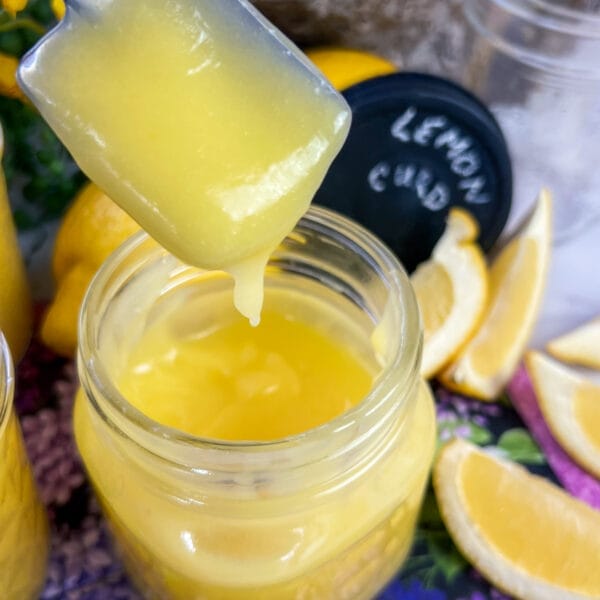
Also Read: Easy Luscious Lemon Bars, Tips for Juicing & Zesting Citrus, Selecting, Storing and Freezing Lemons
This recipe is a combination of tips and techniques picked up from my classic Better Homes and Garden’s Cookbook, Ina Garten’s Lemon Curd, the National Center for Home Food Preservation’s Canned Lemon Curd, Fine Cooking’s Foolproof Lemon Curd and years of experience! I posted my first lemon curd recipe in 2015. I make it at least twice every citrus season (January – March) when the flavor and price of lemons are at their best. Since that first recipe, I’ve played with the technique and sugar amounts to make it even easier and tastier. Check out all the other citrus recipes I’ve posted over the years.

Frequently Asked Questions When Making Lemon Curd with Whole Eggs
1. Can I use whole eggs instead of just egg yolks for lemon curd?
Yes, absolutely! Whole eggs can be used to make lemon curd, providing a simpler method without wasting egg whites. The result will still be creamy and delicious. Any stringy bits of egg white will be removed during the final straining.
You cannot, however, make lemon curd with just egg whites.
2. Will using whole eggs change the texture or flavor of the lemon curd?
Using whole eggs may result in a slightly lighter texture and lighter color compared to using just egg yolks. However, it won’t significantly alter the flavor. The curd will still be rich, tangy, and smooth.
3. Can I adjust the amount of sugar in lemon curd?
Yes, you can. Sugar does provide some structure to the curd, so you can’t omit it completely, but for the amounts in the recipe below – you can adjust up or down by ½ cup of sugar to suit your taste preference.
4. Can I adjust the amount of butter in lemon curd?
Absolutely! Adjusting the amount of butter will affect the richness and creaminess of the lemon curd. Adding more butter will make it creamier, while reducing it will result in a lighter texture. If using unsalted butter, add just a pinch of salt to the curd.
5. How do I prevent lemon curd from curdling or having lumps?
To prevent curdling, it’s crucial to cook the lemon curd over low heat and continuously stir it. Do not boil the lemon curd. Also make sure the sugar and eggs are well combined before adding the juice.
If you see little white bits, that could be the egg white cooking too fast – turn down the heat. It could also be the chalazae – the stringy white bit seen in eggs that holds the egg white to the yolk. Be sure to keep the heat low and stir continually. Any little lumps will be strained out at the end, so you’ll have a nice smooth curd.
6. Can I use lime or other citrus instead of lemons to make curd?
Absolutely! This recipe can be easily adapted to make lime curd, orange curd, or even grapefruit curd using the same method. Just substitute the lemon juice and zest with your preferred citrus fruit. I once made blood orange curd and it was divine.
7. Can I double or halve the recipe for lemon curd with whole eggs?
Yes, you can scale the recipe up or down depending on your needs. Just ensure that you adjust the cooking times accordingly and use a larger or smaller saucepan as necessary.
8. How can I get more lemon flavor in my lemon curd?
For an extra burst of lemon flavor, you can increase the amount of lemon zest in the recipe. Be sure to massage the zest into the sugar to really open the pores of the zest and allow all the flavroful essential oils to infuse into the sugar.
You could also add a little lemon extract, citric acid or True Lemon drink powder to boost the lemon flavor, but I’ve never needed to do that.
9. Do I need a double boiler?
While a double boiler (or bowl over pot of boiling water) is commonly used to gently cook lemon curd, you can also make it directly in a heavy-bottomed saucepan over low heat. Just be sure to stir constantly. Do not walk away! It may take 6-10 minutes for the curd to thicken, but you need to stir constantly over low heat and watch carefully to prevent lumps.
You need the curd to reach an even temperature of 170-180°F (77-82°C) (below boiling) for the eggs to do their job and thicken the curd. The curd will start to thicken at the bottom of the pot where you may feel it with your spoon – keep stirring all over the bottom. As it starts to thicken throughout, turn the heat off and keep stirring while you add the butter. The curd is done when you can run a finger over the spoon and the line it creates stays visible.
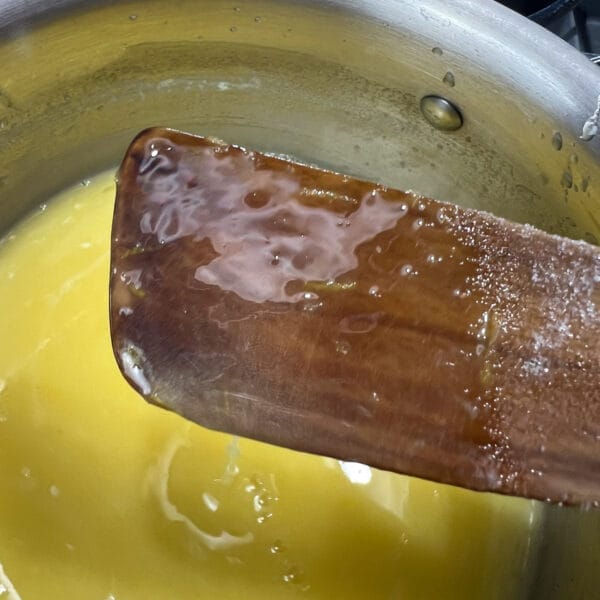
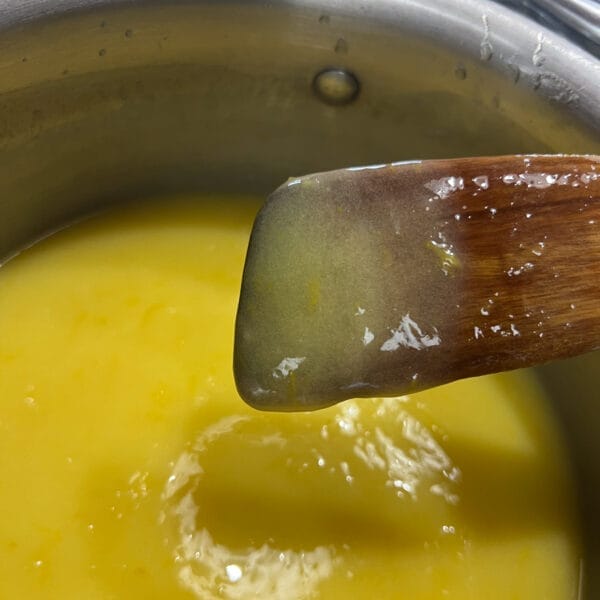
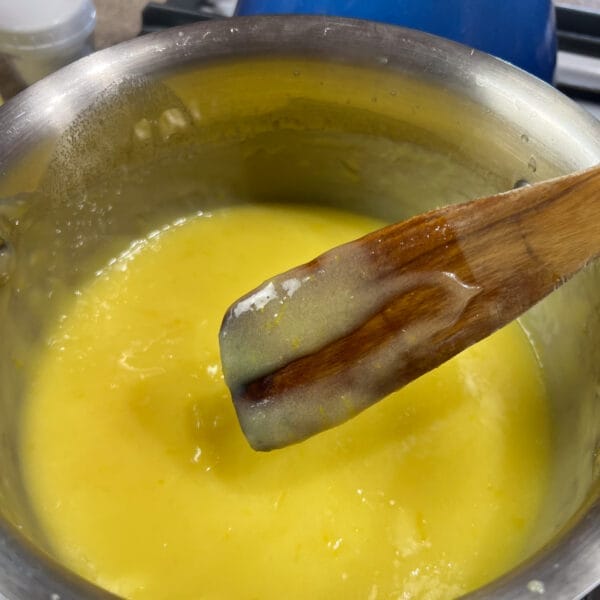
10. Do I have to strain the lemon curd when it’s done?
While straining the lemon curd is not strictly necessary, it helps remove any bits of cooked egg and bits of zest, resulting in a silky smooth texture.
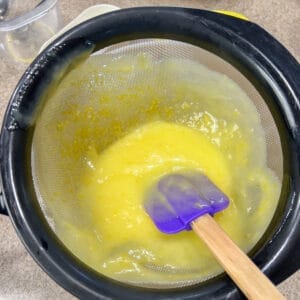
11. How do you store lemon curd and how long will lemon curd last?
Once cool, store in an airtight container in the refrigerator for up to four weeks.
See below for how to freeze lemon curd . To can lemon curd – follow the recipe and instructions from the National Center for Home Food Preservation.
12. How much zest and juice comes from an average-size lemon?
On average, one medium-sized lemon yields about 1 tablespoon of lemon zest and 2 tablespoons of lemon juice. Of course, this varies depending on the size and juiciness of the lemon.
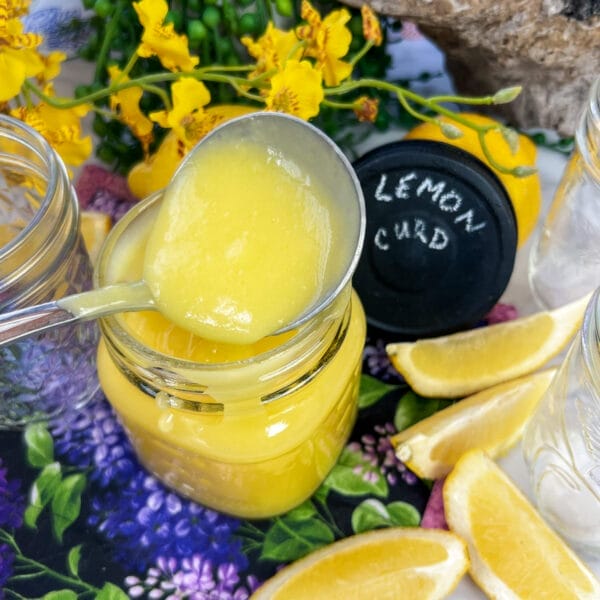
Recipe for Lemon Curd Using Whole Eggs
Lemon Curd with Whole Eggs
Ingredients
- 4 Tbsp lemon zest* 3-4 lemons
- 3/4 cup sugar*
- 4 large eggs
- 1/2 cup lemon juice 2-3 lemons
- 1/4 cup butter, cubed room temp
Instructions
- In medium saucepan, off the stove, mix lemon zest and sugar. Use fingers or back of spoon to press or massage zest into sugar to open the pores of the zest and fully release all the aromatic essential oils.
- Mix in one egg at a time, whisking well until each one is incorporated.
- Add lemon juice and mix well.
- Place pot on stove on LOW heat. Stir constantly until it thickens. To prevent curdling or lumps, stir constantly, use low heat and do not boil. It will take about 10 minutes to reach 170°F (77°C) when the curd will start to thicken. Use an instant read thermometer or check for thickening by dipping wooden spoon into curd and running your finger across the spoon. If the finger line stays, it is done, if not, keep cooking and stirring.
- Stir in butter cubes until melted. Remove from heat and press through a sieve using back of spoon or spatula for a final smooth curd.
- Let cool, stirring several times. The curd will continue to thicken as it cools.
- Once cooled store in fridge for up to 4 weeks. Lemon curd can also be frozen or canned. (See full article)
- Makes: ~2 cups
Video
Notes
Nutrition Facts (per serving)
How to Freeze Lemon Curd Using Whole Eggs
Lemon curd freezes beautifully, here’s how.
- Allow lemon curd to cool thoroughly before freezing.
- Divide into useable portion sizes and pour into freezer grade bags, plastic containers or jars. I like using half pint (8 0z, 1 cup, 150ml) glass canning jars. Tip: – using smaller jars makes it easy to thaw and use just what you need.
- When using rigid containers, always leave room for expansion. Remember liquids expand when frozen, so leave a half inch (2 cm) gap between the top of the jar and the lemon curd.
- Freeze and use within 1 year for best results.
- After thawing, lemon curd will last in the refrigerator for 4 weeks.
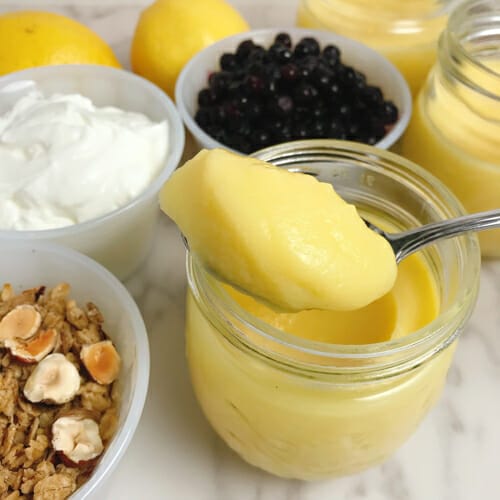
How to Use Lemon Curd
Lemon curd is such a tasty treat, fresh or frozen. It’s worthwhile making a big batch because it freezes so well – the taste and texture stays true after freezing and thawing.
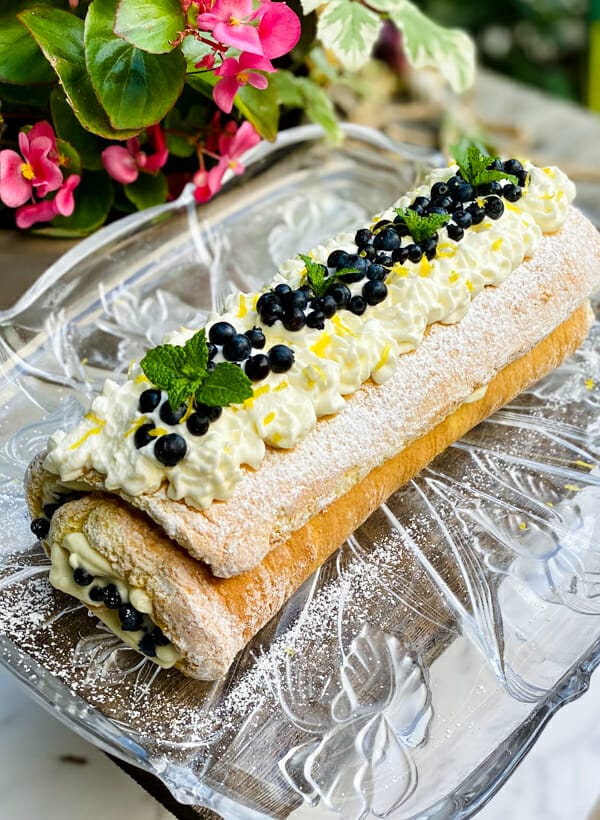
More Ways to Use Lemon Curd
- mixed with plain yogurt and topped with homemade granola and frozen berries
- as a side for pancakes, French toast, crepes or waffles
- spread on top of toast or fresh baked scones
- mixed with yogurt and cream cheese as a fruit dip
- filling for tarts, pies, sandwich cookies or cakes
- mixed with whipped cream for cake roll or Swiss roll as shown in photo
- topping for ice cream
- filling for cheesecake
- as a side for shortbread or muffins
- as a layer in parfaits or trifles
- as a filling for meringues or pavlovas
Do you have a favorite way to enjoy lemon curd?
Select, store and serve seasonal food for everyday cooking with Getty. Getty is a food educator and Professional Home Economist, who loves sharing tips and recipes following the seasons from her Canadian kitchen. Sign up to get seasonal tips and recipes delivered to your inbox. Learn more about Getty or check out her books and pdf guides.



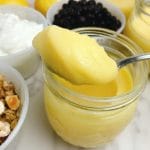
How do you can this since it has eggs
Thanks for your question, Pat. I have added the link for canning lemon curd from the National Center for Home Food Preservation in the post and Notes section of the recipe card.
Been looking for a way to use up 🍋. Thanks
You’re welcome. Enjoy.